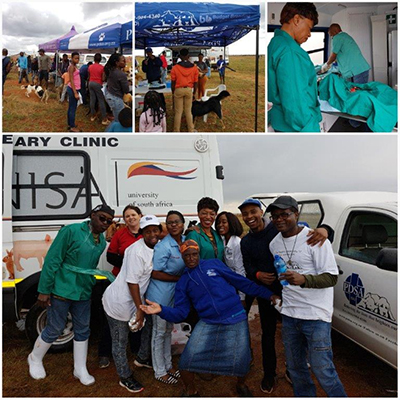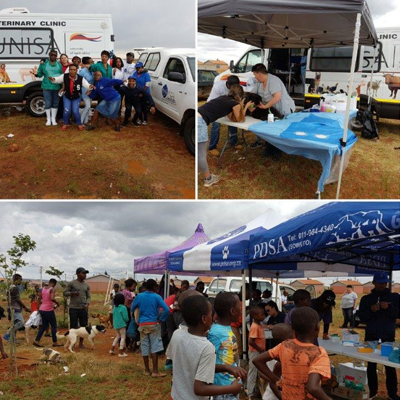
Equipped with state-of-the-art laboratories that provide students with hands-on experiences to bridge theory and practice
 Since its launch in 2016, the Unisa mobile veterinary clinic has been on the road to serve the veterinary needs of communities.
Since its launch in 2016, the Unisa mobile veterinary clinic has been on the road to serve the veterinary needs of communities.
Despite the rain on 7 October 2017, a dedicated team of Unisans from the Department of Agriculture and Animal Health in the College of Agriculture and Environmental Science (CAES) and staff members from the People’s Dispensary for Sick Animals (PDSA) took the mobile veterinary clinic to Soweto. The PDSA provides a veterinary welfare service in South Africa through donations and supports communities.
The aim of the campaign is to bring awareness to communities of rabies, the importance of vaccinating pets and why it is important to neuter or spay pets.
According to the World Health Organisation, an average of 60 000 people die from rabies annually. Rabies is a viral, lethal disease that is transmitted to both humans and other mammals via bites and scratches from an infected animal. It mainly causes an inflammation of the brain. Once the symptoms of rabies appear, the person or animal rarely survives the disease, even with treatment. The prevention of rabies in humans depends on decreasing the disease in the animal kingdom and the compulsory vaccination of susceptible animals is the best way to prevent the disease from spreading.
The team explained the benefits of surgically sterilising pets. Besides preventing unwanted animals from being born, other reasons to spay or neuter your dog include preventing uterine infections and breast tumours in female dogs, and preventing testicular cancer and prostate problems in male dogs.
On the day, more than 60 dogs were vaccinated and 15 sterilisation procedures were carried out in the mobile clinic.
This partnership between CAES and the PDSA is mutually beneficial as it provides an opportunity for staff members to share knowledge and identify research needs, and for animal health student technicians to train “hands on” while interacting with and tackling needs in communities. With this scheduled continuous interaction, the Department of Agriculture and Animal Health is on a roadshow to define tomorrow for our communities.
The PDSA comprised Dr Achilles Kamtubayi, Dr Michael Ciwawa, and team, while the Unisa team included Dr David Mashigo, Dr Keleabetswe Malepe, Charne Etsebeth, Boitumelo Ditle, and Dr Prudence Kayoka (Department of Agriculture and Animal Health, CAES).

*By Prudence Kayoka
Publish date: 2017-10-18 00:00:00.0